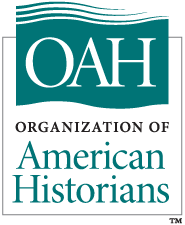Organization of American Historians

The Organization of American Historians (OAH), formerly known as the Mississippi Valley Historical Association, is the largest professional society dedicated to the teaching and study of American history. OAH's members in the U.S. and abroad include college and university professors; historians, students; precollegiate teachers; archivists, museum curators, and other public historians; and a variety of scholars employed in government and the private sector. The OAH publishes the Journal of American History. Among its various programs, OAH conducts an annual meeting[1] each spring, and has a robust roster on its OAH Distinguished Lecturership Program.[2]
The organization's mission is to promote excellence in the scholarship, teaching, and presentation of American history, and encourage wide discussion of historical questions and equitable treatment of all practitioners of history. Membership is open to all who wish to support its mission.
In 2010 its individual membership is approximately 8,000 and its institutional membership approximately 1,250. For its 2009 fiscal year ending June 30, 2009, the organization's operating budget was approximately $2.9 million.[3]
Headquarters[]
The organization's headquarters are in Bloomington, Indiana on the campus of Indiana University in the Raintree House (also referred to as the Millen-Stallknecht House, #105-055-80021 in City of Bloomington Historic Sites and Structures Inventory). The Raintree House is a Greek Revival style brick house. The house gets its name from two large raintrees (Koelreuteria paniculata), which stand on the property. Built by William Moffett Millen c. 1845, it is an excellent example of the Georgian house plan favored by well-to-do farmers in southern Indiana and the Upland South in the mid-nineteenth century.[4]

History and background[]
The Mississippi Valley Historical Association was formed on October 17 and 18, 1907 at a meeting in Lincoln, Nebraska, of seven historical societies of the Mississippi Valley. The organization, devoted to studying the Mississippi Valley region, began a tradition of holding an annual meeting each year, and began quarterly publication in 1914 of the Mississippi Valley Historical Review. As the scholarly emphasis of the organization and its journal developed and spread over time, its initial emphasis on the Mississippi Valley came under sharp challenge from members who wanted a better title and a wider scope. Ray Billington identifies the four issues that caused bitter quarrelling: the desire to use the association's prestige to fight for liberal reforms, to change the association's name to represent a national scope, to democratize its oligarchical structure, and to take a firm stand against racial discrimination in terms of hotels and meeting cities. The reformers were successful in the mail ballot and the Mississippi Valley Historical Review was renamed the Journal of American History and the organization, correspondingly was renamed the Organization of American Historians.[5][6][7]
Indiana University was selected as home for the editorial offices of the Mississippi Valley Historical Review predecessor to the Journal of American History in 1963.[8] Prior to relocating to Indiana, the editorial offices were located at Tulane University. The organization moved its business offices to Indiana in the summer of 1970 from its home on the campus of the University of Utah in Salt Lake City, Utah.
The OAH was admitted to the American Council of Learned Societies in 1971. It is a foundational partner of the National Coalition for History and the National Humanities Alliance.
Information about OAH governance, officers, and its committee structure is available online.[9]
List of Mississippi Valley Historical Association and OAH Presidents[]
Mississippi Valley Historical Association Presidents[]
|
OAH Presidents[]
|
|
OAH Awards and Prizes[]
The following is a list of Awards and Prizes given by Organization of American Historians.[10]
- Erik Barnouw Award
- Ray Allen Billington Prize
- Merle Curti Award
- Friend of History Award
- Ellis W. Hawley Prize
- Darlene Clark Hine Award for best book in African American Women and Gender History (2010-)[11]
- Richard W. Leopold Prize
- – established in 1992 and named for Gerda Lerner and Anne Firor Scott[12]
- Lawrence W. Levine Award
- Liberty Legacy Foundation Award
- James A. Rawley Prize
- Frederick Jackson Turner Award
References[]
- ^ "Conference on American History | OAH". www.oah.org.
- ^ "OAH Distinguished Lectureship Program | OAH". www.oah.org.
- ^ "OAH Treasurer’s Report, Fiscal Year, 2009", Robert Griffith, OAH Treasurer, February 8, 2010 "Archived copy" (PDF). Archived from the original (PDF) on 2010-12-21. Retrieved 2012-01-06.CS1 maint: archived copy as title (link)
- ^ Katherine Roberts, Description and History of Indiana University's Raintree House for Nomination of the Property to the National Register of Historic Places, March, 2003, p 1.
- ^ William D. Aeschbacher, "The Mississippi Valley Historical Association, 1907-1965", Journal of American History, Vol. 54, No. 2 (Sep., 1967), pp. 339-353.
- ^ Ray Allen Billington, "From Association to Organization: The OAH in the Bad Old Days." Journal of American History 65.1 (1978): 75-84.
- ^ Official Notice to Members of the Mississippi Valley Historical Association, Journal of American History, Vol. 51, No. 2 (Sep., 1964), pp. 351-352.
- ^ Thomas D. Clark, Our Roots Flourished in the Valley, Journal of American History, Vol. 65, No 1 (Jun., 1978), p 102.
- ^ "About the OAH | OAH". www.oah.org.
- ^ "OAH Awards and Prizes". The Organization of American Historians: Programs & Resources. The Organization of American Historians. Retrieved 2013-11-03.
- ^ "Darlene Clark Hine Award". Organization of American Historians. Retrieved May 12, 2017.
- ^ Hillel Italie (February 15, 2019). "Anne Firor Scott, groundbreaking historian, dead at 97". 660citynews.com. Retrieved February 16, 2019.
Further reading[]
- Kirkendall, Richard S., ed. The Organization of American Historians and the Writing and Teaching of American History (2011), essays on the history of the OAH, and on teaching main themes
External links[]
![]() Media related to Organization of American Historians at Wikimedia Commons
Media related to Organization of American Historians at Wikimedia Commons
- Organization of American Historians
- History organizations based in the United States
- Organizations established in 1907
- Professional associations based in the United States
- 1907 establishments in the United States